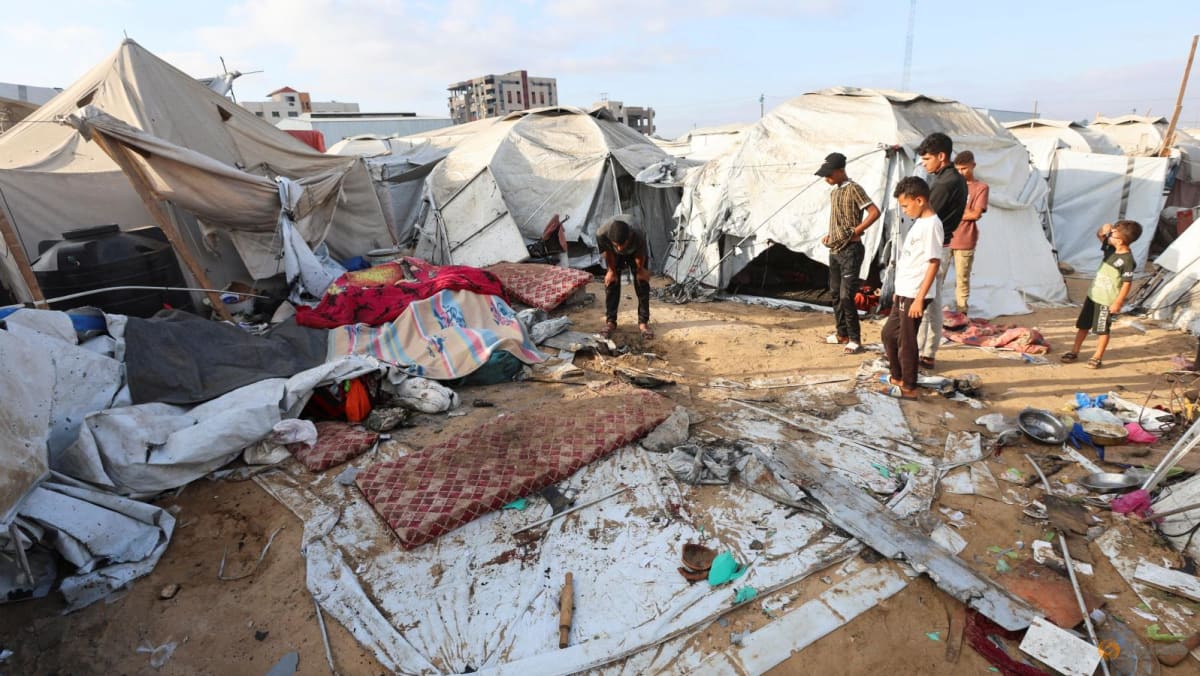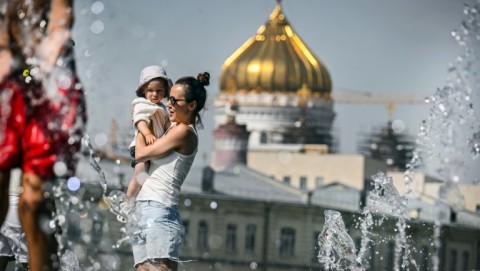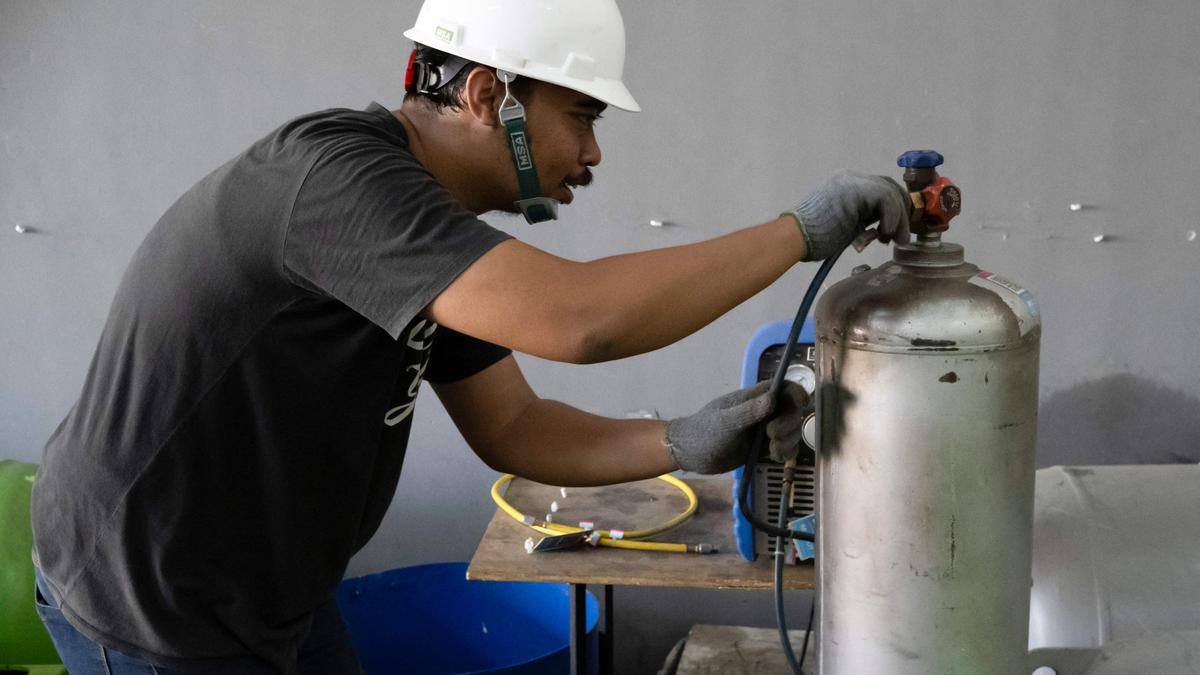Inside 'Indonesia's Alcatraz' surrounded by impenetrable jungle where inmates are forced on death marches and executed
THIS hellish island prison dubbed “Indonesia’s Alcatraz” sees death rows inmates held in “excruciating” conditions before they face jungle death marches and firing squad executions.
Nusakambangan Island is home to a number of brutal jails where inmates are left waiting to die in foul overcrowded cells with meagre rations.

21

21

21

21

21
Lawyers who have worked on cases for inmates on the island said the prison island is the source of “numerous human rights violations”.
Yosua Octavian, who works for the Legal Aid Institute in Indonesia, said all of his clients who have been imprisoned on the infamous island say they “would never want to be there again”.
And human rights lawyer Ricky Gunawan, who represented a death row inmate on the island all the way up until his execution, told The Sun prisoners only get three days notice before their barbaric execution.
He said during these “excruciating” 72 hours, prisoners are kept in isolation cells and only allowed brief contact with their legal team until their demise.
Also monikered “execution island”, the sprawling prisons are located off the Cilacap coast in central Java.
The island stands as a symbol of Indonesia’s tough war on drugs.
The least horrific conditions for prisoners on the 212-square-kilometres island involve inmates undertaking manual labour.
Meanwhile, those on death row face the prospect of being blindfolded, led by chain to a jungle, tied to a pole and shot by a firing squad.
The island is known for giving prisoners minimal contact with the outside world – including legal aid which inmates are given “inconsistent access” to.
Moment ten ‘armed & dangerous’ inmates break out of jail through hole in cell
Media outlets who want to visit will also find it extremely difficult to obtain a licence to enter the prison complex.
Gunawan explained that the island is “quite restricted” for visitors, and that “additional costs and multiple security checks before the visit” make the journey much more inconvenient.
“It’s very hard for families to reach out,” he said, explaining how this isolation takes a heavy mental toll on inmates.
Octavian confirmed this fact and said that visitors require ” a lot of time and cost” to get there – including the families of inmates.
They are even discouraged to travel due to the islands terrifying reputation.
“Families do not dare to go there,” he claimed.
Past allegations of torture and mistreatment from human rights groups continue to plague the prisons’ fearful reputation.
In March 2019, viral footage in Indonesia showed shackled prisoners being dragged across gravel by prison guards while on their way to Nusakambangan.

21

21

21
The horrifying footage of the men sparked backlash as it showed the degraded men with red marks on their bare backs.
Case worker Octavian said: “Regarding human rights violations in [these] prison conditions, they are actually quite numerous.”
He recalled travelling to the island by boat in December 2024 to meet a client while two convicts lay next to him with “their feet and hands shackled and handcuffed”.
An intimidating “special police offer carrying an AK-47 rifle and wearing a mask” also kept them in line.
“Even their faces were covered with black cloth, so they couldn’t see,” Octavian said.
After officers told him that this practice was enforced to make sure the convicts could not resist or escape, he thought that this reasoning was “far-fetched and unreasonable”.
He said: “That constitutes an inhumane act.”
Human rights lawyer Gunawan confirmed the harsh reality of life on Nusakambangan Island, explaining what nutrition is like on a day-to-day basis.
“Food in general is not adequate,” he said, adding that prisoners receive barely any meals each day.
“It’s like very basic, just rice and very little portions.”

21

21

21
One prisoner at Narkotika reportedly complained that the food provided was so bad that they lost 20kg in three months and suffered from food poisoning.
The human rights expert also said that the horrific cells within the notorious prison complex were “overcrowded”.
“So, for example, if it’s only for one person, they put maybe 4 or 5 persons [in each cell],” he said.
But the lawyer also said that those who want “better food” or even their own cell can bribe officers to escape the harrowing conditions.
He described corruption in Indonesian prisons as “rampant”.
Nusakambangan Island served as a penal colony when Indonesia’s Dutch rulers started holding prisoners there over a century ago.
But those colonial cells have since been decommissioned – while new modern prisons have propped up across the island.
Out of the eight total operational facilities on the dreaded island, the most pleasant is an “open” prison, where inmates work in fields and carve gemstones to be used for jewellery.
Meanwhile, one of the most notorious maximum-security prisons, Narkotika, is infamous for its ghastly conditions – and exclusively houses drug offenders.
Octavian claimed that Karanganyar was another jailhouse which had a similarly grim reputation.
He said: “There is one special prison with a ‘high risk’ status, which is above the ‘maximum’ status. That prison is called Karanganyar.”

21

21

21
All of Octavian’s clients who were transferred to Nusakambangan Island had to “go through Karanganyar Prison first”.
“When I asked all my clients, they said they would never want to be there again,” he said of the particularly horrific slammer.
Detailing its conditions, he said: “There, each inmate occupies one cell alone and is monitored by CCTV cameras in every cell.
“All activities can be seen and known at any time by the officers.”
He added that “everyone there definitely experiences psychological pressure”, and highlighted Karanganyar as the “most troublesome” jailhouse there.
24-hour surveillance standards are also implemented at Narkotika, according to Prison Insider.
They also reported that inmates are allowed to walk in front of their cells for one hour per day – provided they are handcuffed, leg-cuffed and under strict supervision.
Prison worker Octavtian added that there is no special facility for women on the island, and therefore “all prisons are only inhabited by adult males”.
Aside from Narkotika and Karanganyar, the other jailhouses are named: Besi, Batu, Kembang Kuning, Pasir Putih, Permisan and Terbuka.
Human rights lawyer Gunawan represented death row inmate and alleged “drug convict” Humphrey Jefferson Ejike before he was executed on the island in July 2016.

21

21

21
The Nigerian priest, known as Jeff, was tortured after his arrest in 2003 before serving the last 12 years of his life on the infamous island.
His lawyer Gunawan told The Sun: “He was tortured when he was at the police investigations, you know, beaten.
“Mainly beaten with chairs, the police stomped on his feet – that kind of physical torture.”
After being forced to “confess” to dealing drugs he was tried and sentenced to death in 2004 before being booked in on the island.
Gunawan remembered the emotional day he said goodbye to Jeff in July 2016 before he was chained up and taken to an ominous killing field.
The Nigerian national handed his glasses and sports watch to Gunawan before he faced a 10-man executioner squad – nine of which were given fake rubber bullets.
A doctor also marked a point on Jeff’s heart to improve visibility during the midnight execution.
Gunawan, who was made to stay at the prison as Jeff was escorted out, recalled: “I could roughly hear the sound of the guns of the firing squad.”
Condemned offenders are also given the option of wearing a blindfold, according to Gunawan.
They can also choose to stand, sit or kneel before they are tied to a post and shot.
Jeff’s corpse was brought back to the prison, where the lawyer verified the priest’s identity.

21

21

21
Gunawan believes the 72 hours before execution are the most agonising for inmates like Jeff.
“I think mostly the three days, some would say these are more excruciating,” he said.
“Because they finally understood that there’s a date now for executions.”
He emphasised “the psychological element” because of “the prolonged uncertainty of execution dates”.
The two most notorious killing sites are known as the Nirbaya and Li-musbuntu shooting fields.
Indonesian law states that prisoners sentenced to death must be isolated – in the same way Jeff was – before they are executed.
But the isolation cells are also used to detain misbehaving prisoners who commit acts of violence, including self-harm and suicide attempts.
Indonesia’s no-nonsense approach to narcotic criminals has been compared to the brutal efforts of former Philippine president Rodrigo Duterte.
At the end of last year, KontraS recorded that there were 530 prisoners on death row in Indonesia, with 88 of them being foreigners.

by Harvey Geh
2014: Shortly after being elected in 2014, Indonesian President Joko “Jokowi” Widodo ordered the resumption of death row executions after an unofficial moratorium introduced in 2010.
2015: Australian nationals Andrew Chan and Myuran Sukumaran were executed by firing squad on April 29 after they were convicted of heading the Bali Nine drug ring and sentenced to death in 2006. Six other convicted drug smugglers were also executed on the same day in Besi prison on the island, while a ninth female Filipino convict was spared at the last minute.
2016: On July 29, one Indonesian national and three Nigerian drug convicts, including Humphrey Jefferson Ejike, were killed by firing squad on the island. 10 convicts who were supposed to be killed alongside them had a last-minute stay of execution.
Indonesia executed 23 people between 2013 and 2016, and there have been no recorded executions since then – although hundreds more death sentences have been handed out.
Former Indonesian President Joko Widodo drew criticism after renouncing a moratorium on capital punishment and ordering enforcement officers to shoot drug dealers.
Incumbent president and ex-army general Prabowo Subianto has made more of an attempt to repatriate foreign convicts in an effort to improve his international reputation.
But the leader has stopped short of closing the infamous execution prison.
Another example of alleged abuse came in 2012 when prisoner Johan Teterissa was beaten using electric cables at Batu Prison on the island, according to Amnesty International.
He was initially arrested after taking part in a peaceful demonstration in Ambon.
Amnesty said: “The guards whipped Johan Teterissa’s back with electric cables causing him to bleed.
“He has not received any medical treatment following the beating.”
The latest Brit to face the possibility of life on the island is Thomas Parker.
He is accused of importing and trafficking more than a kilogram of MDMA into Bali, and now faces the death penalty if found guilty.
And in February, it was reported that Britain’s “most prolific” rapist Reynhard Sinaga could be moved from his maximum security cell in the UK to Nusakambangan Island.
Indonesian law minister Yusril Ihza Mahendra said his country was in “early talks” with the UK government regarding a potential extradition or prisoner swap.

21
You may also like...
Diddy's Legal Troubles & Racketeering Trial

Music mogul Sean 'Diddy' Combs was acquitted of sex trafficking and racketeering charges but convicted on transportation...
Thomas Partey Faces Rape & Sexual Assault Charges

Former Arsenal midfielder Thomas Partey has been formally charged with multiple counts of rape and sexual assault by UK ...
Nigeria Universities Changes Admission Policies

JAMB has clarified its admission policies, rectifying a student's status, reiterating the necessity of its Central Admis...
Ghana's Economic Reforms & Gold Sector Initiatives

Ghana is undertaking a comprehensive economic overhaul with President John Dramani Mahama's 24-Hour Economy and Accelera...
WAFCON 2024 African Women's Football Tournament

The 2024 Women's Africa Cup of Nations opened with thrilling matches, seeing Nigeria's Super Falcons secure a dominant 3...
Emergence & Dynamics of Nigeria's ADC Coalition

A new opposition coalition, led by the African Democratic Congress (ADC), is emerging to challenge President Bola Ahmed ...
Demise of Olubadan of Ibadanland
Oba Owolabi Olakulehin, the 43rd Olubadan of Ibadanland, has died at 90, concluding a life of distinguished service in t...
Death of Nigerian Goalkeeping Legend Peter Rufai

Nigerian football mourns the death of legendary Super Eagles goalkeeper Peter Rufai, who passed away at 61. Known as 'Do...





